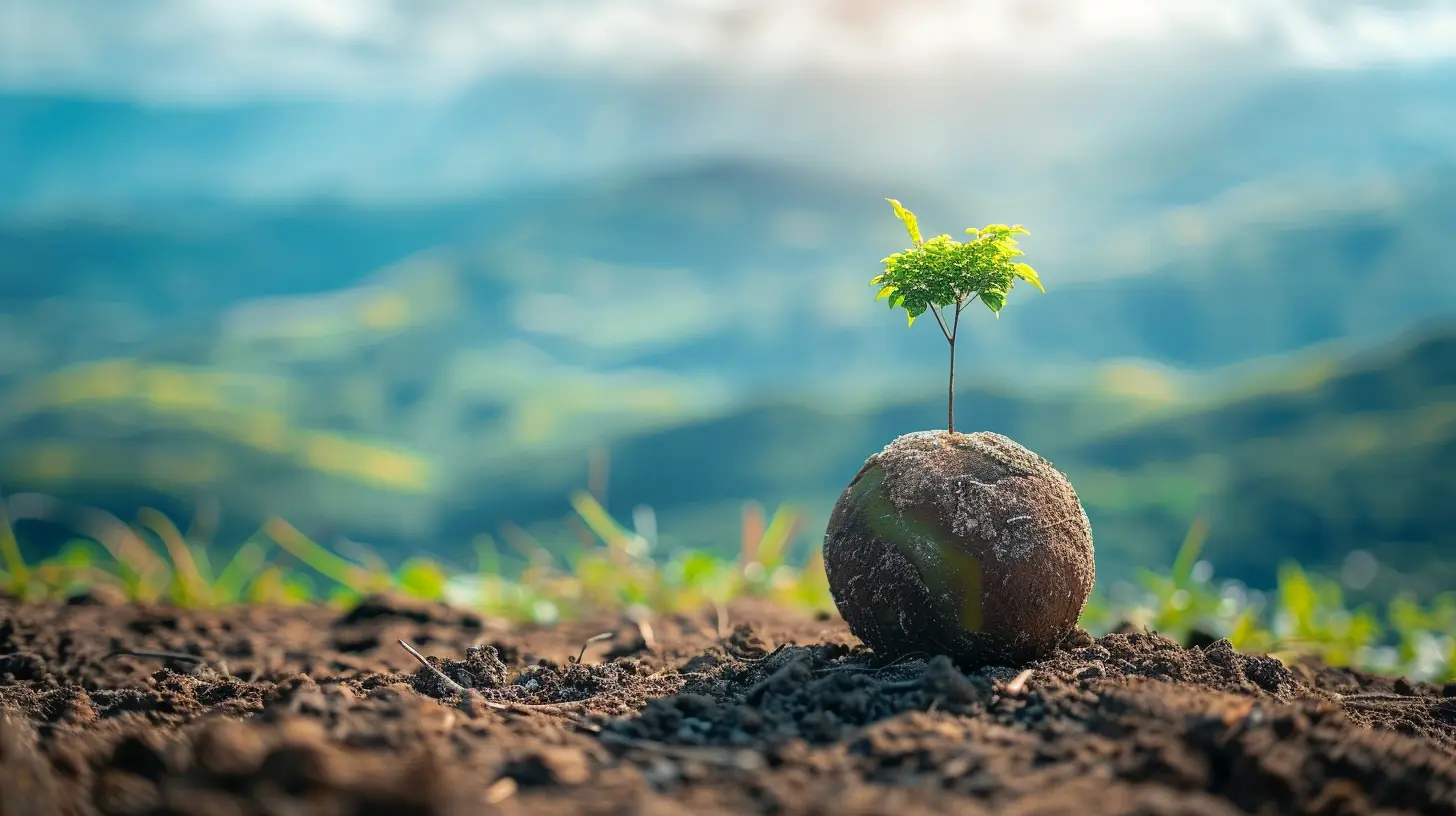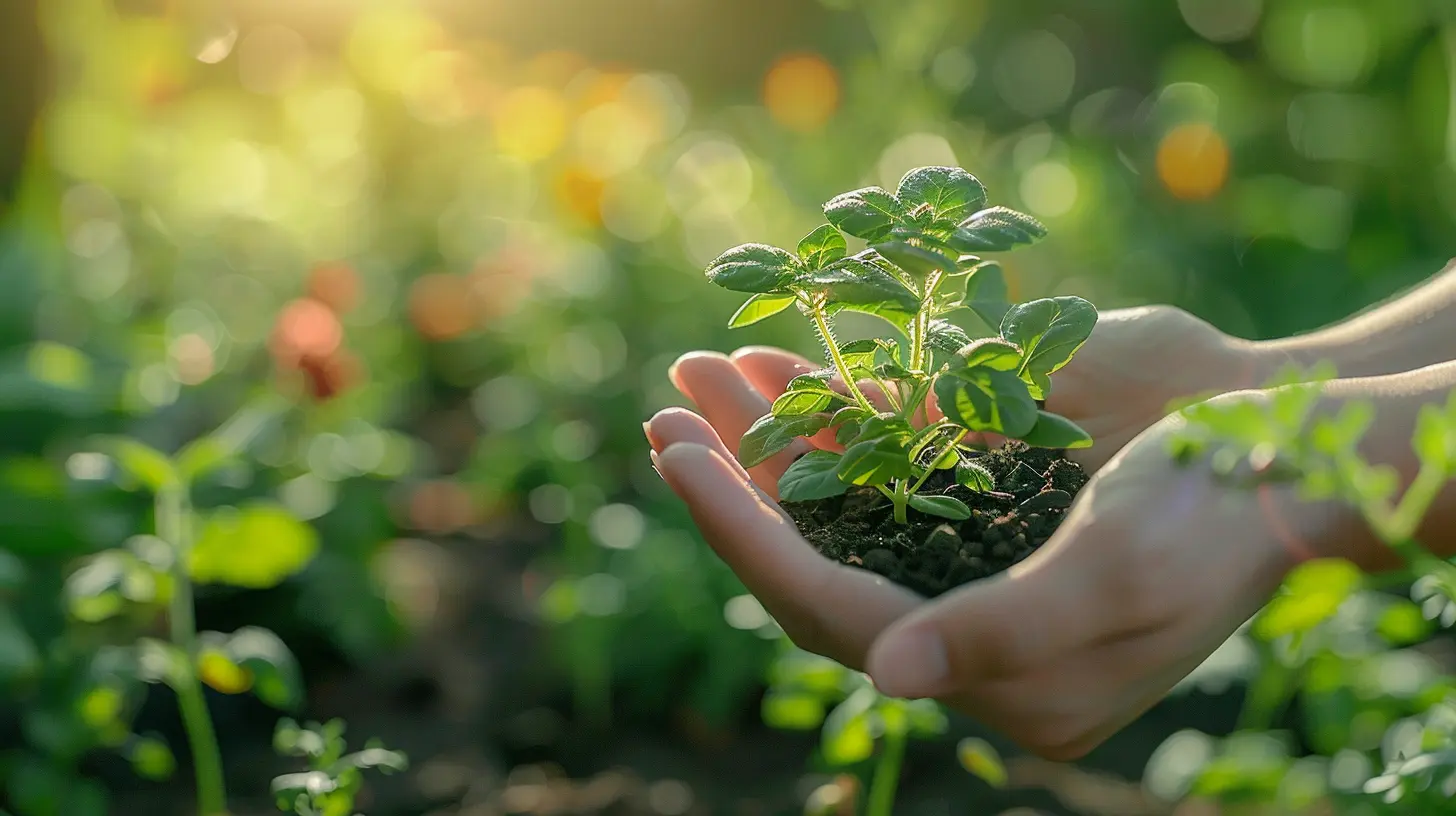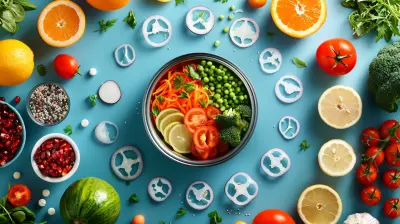Sustainable Living: How a Plant-Based Diet Reduces Your Carbon Footprint
15 January 2025
Living sustainably isn’t just a buzzword anymore—it’s a way of life that’s gaining momentum as more of us recognize the impact of our daily choices on the environment. But here’s a question you might not have thought about: Have you ever connected what’s on your plate with the health of our planet? If the answer is no, you're not alone. Yet, one of the most powerful ways to live sustainably is through what you eat. Enter the plant-based diet—a simple yet transformative shift that could significantly reduce your carbon footprint. Let’s dive into the details and uncover how munching on more plants can make you not just healthier but also kinder to the Earth.
What Is a Carbon Footprint, Anyway?
Before we get into the plant-based goodness, let’s back up a little. What exactly is your carbon footprint? Put simply, it’s the total amount of greenhouse gases (like carbon dioxide and methane) that are emitted directly or indirectly by your actions. Everything from driving your car and heating your home to—yes—you guessed it, what you eat, contributes to this footprint.The food system, in particular, is a massive emitter of greenhouse gases, accounting for roughly one-third of global emissions. And spoiler alert: Animal agriculture is one of the biggest culprits. Why? Because producing meat, especially beef and lamb, requires enormous amounts of resources like land, water, and feed. Oh, and don’t forget the methane emissions from livestock (it's like CO2's evil twin, packing an even bigger warming punch).
Why A Plant-Based Diet Is the Hero We Need
Switching to a plant-based diet is like trading in a gas-guzzling SUV for a sleek, zero-emission electric car—it’s better for the planet in every possible way. Here’s why:1. Fewer Greenhouse Gas Emissions
Animal agriculture is responsible for approximately 14.5% of global greenhouse gas emissions, which is more than what the entire transportation sector produces. Think about that for a second. By cutting back on meat and dairy, you’re directly reducing demand for livestock farming, which means fewer emissions from things like manure, feed production, and methane-burping cows.
Want to see the numbers? Producing a kilogram of beef emits about 60 kilograms of CO2 equivalent, while the same amount of vegetables only emits 2-3 kilograms. That’s a massive difference!
2. Less Water Usage
Did you know that it takes over 1,800 gallons of water to produce just one pound of beef? To put that into perspective, that’s about 53 bathtubs full of water! Meanwhile, growing a pound of veggies or grains requires only a fraction of that amount.If we all cut back on animal products, we’d save billions of gallons of water each year—water that could be used for drinking, farming, and sustaining ecosystems. So, next time you're enjoying a lentil curry or a veggie burger, remember you’re saving a whole lot more than just calories.
3. Preserving Precious Land
Here’s a shocking stat: Around 77% of global agricultural land is used for raising livestock or growing feed for them, yet animal products only make up about 18% of global calorie consumption. That’s wildly inefficient, don’t you think?Switching to a plant-based diet could free up millions of acres of land currently dedicated to animal agriculture. This land could then be reforested, turned into grasslands, or used to grow more sustainable crops—all of which help absorb carbon and combat climate change.
4. Mitigating Deforestation
Many people don’t realize that a significant chunk of deforestation happens to make room for livestock grazing or to grow animal feed like soy and corn. The Amazon rainforest, often referred to as the "lungs of the Earth," has been a particularly tragic casualty of this. Adopting a plant-based diet reduces the demand for these activities, ultimately saving precious forests and the wildlife that call them home.5. Reducing Pollution
Livestock farming isn’t just a land and water hog; it’s also a major source of pollution. Animal waste can contaminate water supplies, while fertilizers used to grow feed lead to harmful algal blooms and dead zones in oceans. By eating more plants, you’re not only cutting emissions but also fighting against water and soil pollution caused by industrial farming.
But... Do I Have to Go 100% Vegan?
Here’s the good news: You don’t need to go all-in to make a difference. Even small changes can add up. Ever heard of Meatless Mondays? It’s a simple way to start. Eating plant-based meals just a few times a week, or choosing plant-based alternatives like almond milk or tofu instead of meat or dairy, can have a meaningful impact.Think of it this way: Every plant-based choice you make is like casting a vote for a healthier planet. So, whether you’re ready to go fully vegan or just want to dip your toes in, pat yourself on the back—because you’re making a difference.
The Health Perks Are a Bonus
While reducing your carbon footprint is the main focus here, it’s worth mentioning that a plant-based diet is a win for your health, too. Studies have shown that eating more fruits, veggies, whole grains, and legumes can lower your risk of chronic diseases like heart disease, diabetes, and certain cancers. Plus, who doesn’t want to feel lighter and more energized?It’s like hitting two birds with one stone—except, you know, without the actual birds.
How To Get Started with a Plant-Based Diet
Ready to give plants a bigger role on your plate? Here are a few tips to make the transition smoother than a creamy avocado hummus:- Start Small: Swap out one or two meals a week for plant-based options. Love spaghetti? Try a lentil Bolognese instead.
- Get Creative: Experiment with new recipes, spices, and ingredients. You might discover you actually love tofu or jackfruit!
- Find Substitutes: Missing cheese? Try plant-based alternatives like cashew cheese or nutritional yeast. Craving a burger? Plant-based patties like Beyond Meat or Impossible Foods are game-changers.
- Plan Ahead: Meal prep is your best friend, especially when trying to stick to new habits. Having prepped veggies, beans, and grains in your fridge makes it easier to whip up a quick meal.
- Educate Yourself: Learn about the environmental benefits of a plant-based diet to keep yourself motivated. Understanding the "why" behind your actions can make the "how" much easier.
The Bigger Picture: It's Not Just About You
While it’s easy to focus on personal benefits like better health, it’s important to remember the bigger picture. Sustainable living is a collective effort. By embracing plant-based eating, you're setting an example for others and contributing to a global movement that prioritizes the health of our planet over convenience.Think of it like a ripple effect in a pond—your small change could inspire others to make their own sustainable choices, creating a wave of positive impact. And isn’t that kind of legacy worth leaving?
Final Thoughts: Eating With Purpose
In a world where climate change is becoming increasingly urgent, the power to make a difference lies on our plates. By adopting a plant-based diet, even partially, you’re not just reducing your carbon footprint; you’re voting for a kinder, cleaner, and more sustainable world. So next time someone asks you why you’re eating a veggie burger instead of a beef patty, tell them: "I’m saving the planet, one bite at a time.all images in this post were generated using AI tools
Category:
Plant Based DietAuthor:

Jackson Mahoney
Discussion
rate this article
13 comments
Sylph Yates
A plant-based diet not only nurtures our health but also cultivates a greener, more sustainable planet.
April 6, 2025 at 3:55 AM

Jackson Mahoney
Thank you for your insightful comment! A plant-based diet indeed benefits both our health and the environment, significantly lowering our carbon footprint and promoting sustainability.
Bear McAleer
Going green is as easy as swapping steak for a salad! Let’s munch on greens and save the planet—one bite at a time! 🌱🌍
March 30, 2025 at 3:14 PM

Jackson Mahoney
Absolutely! Every small change, like choosing a salad over steak, contributes to a healthier planet. Let's keep making those mindful choices! 🌿
Imani Webster
Thank you for this insightful article! Embracing a plant-based diet is a powerful way to promote sustainability and reduce our environmental impact. Every small change matters!
February 10, 2025 at 4:28 PM

Jackson Mahoney
Thank you for your kind words! I'm glad you found the article insightful. Every small step toward a plant-based diet can indeed make a significant difference for our planet!
Jackson Campbell
Embracing a plant-based diet isn’t just a trend; it’s a necessity. By choosing plants over meat, we actively combat climate change and cultivate a healthier planet. Let’s be bold and unapologetic in our pursuit of sustainability!
February 1, 2025 at 5:15 PM

Jackson Mahoney
Absolutely! A plant-based diet is a powerful way to reduce our carbon footprint and promote sustainability for future generations. Thank you for advocating for this vital change!
Reagan McDaniel
Thank you for this insightful article! It's inspiring to see how simple dietary changes can have such a positive impact on our planet. I’m eager to explore more plant-based options in my meals and contribute to a healthier Earth. Small steps can lead to meaningful change!
January 27, 2025 at 5:47 PM

Jackson Mahoney
Thank you for your kind words! I'm glad to hear you're inspired to explore plant-based options—every small step truly makes a difference for our planet!
Sable McCaffrey
Thank you for this enlightening article! Embracing a plant-based diet is a wonderful way to nourish our bodies and the planet. 🌱💚
January 23, 2025 at 5:11 AM

Jackson Mahoney
Thank you for your kind words! I'm glad you found the article enlightening. 🌱💚
Rex McIlwain
Thank you for this insightful article! It's encouraging to see how a plant-based diet can contribute to sustainability and lower our carbon footprints. Your tips for incorporating more plant-based meals into our diets are especially helpful. Looking forward to making these positive changes in my own lifestyle!
January 19, 2025 at 3:18 AM

Jackson Mahoney
Thank you for your kind words! I'm glad you found the article helpful and inspiring. Best of luck with your plant-based journey!
Gianna McMillan
Going green with a plant-based diet? 🌱 It’s like giving Mother Earth a big, eco-friendly hug while munching on tasty veggies! 🌍💚
January 18, 2025 at 4:32 PM

Jackson Mahoney
Absolutely! A plant-based diet is a delicious way to support the planet while reducing your carbon footprint. Every bite counts! 🌱💚
Mara Hamilton
This article effectively highlights the environmental benefits of adopting a plant-based diet. By reducing meat consumption, individuals can significantly lower their carbon footprint while promoting better health. It's a win-win for both personal well-being and the planet! Great insights!
January 18, 2025 at 5:22 AM

Jackson Mahoney
Thank you for your kind words! I'm glad you found the article informative and that it emphasizes the dual benefits of a plant-based diet for both health and the environment.
Harley McKellar
Great insights! Embracing a plant-based diet not only benefits our health but also significantly helps the environment. Keep inspiring!
January 17, 2025 at 3:53 PM

Jackson Mahoney
Thank you for your kind words! I'm glad you found it inspiring. Together, we can make a positive impact on our health and the planet!
Esme Rosales
Adopting a plant-based diet is a powerful way to lessen your carbon footprint. By choosing more fruits, vegetables, and whole grains, you not only improve your health but also contribute to a healthier planet.
January 17, 2025 at 5:23 AM

Jackson Mahoney
Thank you for highlighting the connection between a plant-based diet and sustainability! Every small change in our food choices can have a significant impact on both our health and the planet.
Elise Hahn
This article brilliantly highlights the environmental impact of food choices. Transitioning to a plant-based diet not only promotes personal health but significantly lowers greenhouse gas emissions, fostering a sustainable future. It's a powerful reminder that our diet can drive positive change.
January 15, 2025 at 4:28 PM

Jackson Mahoney
Thank you for your insightful comment! I'm glad you found the article impactful in highlighting the connection between plant-based diets and environmental sustainability. Every choice counts!
Franklin Romero
This article presents a fascinating perspective on how our food choices impact the planet! I'm intrigued by the connection between a plant-based diet and sustainability—definitely considering making some changes in my eating habits!
January 15, 2025 at 4:40 AM

Jackson Mahoney
Thank you for your thoughtful comment! I'm glad you found the connection between a plant-based diet and sustainability intriguing. Every small change can make a big difference!
MORE POSTS
The Importance of Tracking Progress in Your Fitness Journey

Hydration in Pre and Post-Workout Recovery

Can Fasting Improve Your Immune Health?

Gut Health and Inflammation: How They’re Connected

Debunking Myths About Gut Health: What Science Really Says

Stress and Social Media: How to Protect Your Mental Health Online

The Role of Genetics in Dental Health

How Traveling Affects Your Hydration Levels

Reset Your Habits: The Power of a Weekly Health Check-In